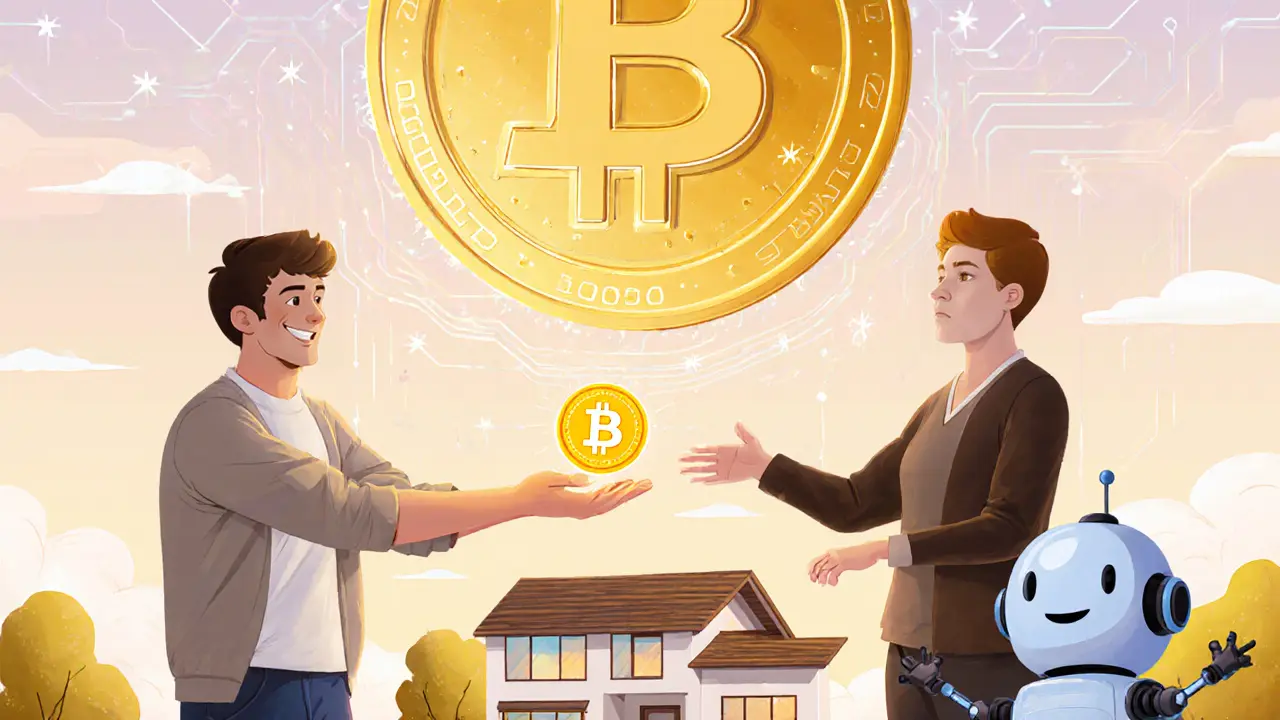Blockchain Real Estate Transaction Calculator
Transaction Comparison
| Aspect | Traditional | Blockchain |
|---|---|---|
| Closing Time | 30-60 days | Hours-Days |
| Intermediaries | Title company, escrow agent, lawyers | Smart contract (optional legal counsel) |
| Paperwork | Hundreds of pages | Digital records only |
| Transaction Cost | $5,000-$15,000 | $250-$500 |
| Transparency | Limited, siloed databases | Public ledger, immutable audit trail |
| Fractional Ownership | Rare, complex legal structures | Tokenized shares, low entry point |
Imagine closing on a house in a few hours instead of waiting weeks for paperwork and bank transfers. That’s the promise of blockchain real estate. By recording ownership on a distributed ledger and letting smart contracts handle the hand‑off, the whole process becomes faster, cheaper, and more transparent.
Key Takeaways
- Blockchain creates an immutable, digital record of property ownership.
- Smart contracts automatically transfer title and funds once conditions are met.
- Tokenization lets investors buy fractions of a property for as little as $50.
- Typical closing times drop from 30‑60 days to hours or a few days.
- Regulatory acceptance varies; some jurisdictions still require traditional paperwork.
What is a blockchain real estate transaction?
Blockchain real estate transaction is a property transfer recorded on a decentralized ledger where ownership data, transaction history, and contract terms are stored immutably. The ledger is replicated across a network of computers, so no single party can alter the record without consensus.
This model first appeared after Bitcoin proved that a distributed ledger could secure value. By 2017‑2018 companies such as Propy and RealT built platforms that let buyers, sellers, and title agents interact directly on the chain, bypassing many middlemen.
How smart contracts power the deal
Smart contract is a self‑executing program stored on a blockchain that runs when predefined conditions are satisfied.
In a property sale, the contract typically contains:
- Verification of the seller’s title.
- Agreement on purchase price and payment method (crypto or fiat).
- Escrow logic that releases funds only after title transfer is recorded.
- Post‑closing actions such as dividend distribution for tokenized assets.
When the buyer deposits the agreed amount, the contract checks the title record. If everything matches, the ledger updates the ownership token and releases the funds-all without a human escrow officer.
Tokenization and fractional ownership
Tokenization converts a real‑world property into a digital asset represented by tokens on a blockchain.
Each token stands for a share of the equity. Platforms like RealT issue ERC‑20 tokens on the Ethereum network, allowing investors to purchase as little as $50 of a rental property. Ownership percentages are recorded on‑chain, and rental income is automatically distributed to token holders via the same smart contract.
This approach unlocks liquidity that traditional real estate cannot provide. Investors can buy, sell, or trade their slices on secondary markets just like any cryptocurrency.

Step‑by‑step: Buying a property on the blockchain
- Create a crypto wallet. Download a reputable wallet (e.g., MetaMask), secure the seed phrase, and fund it with ETH or a stablecoin.
- Complete KYC. Most platforms require identity verification to comply with anti‑money‑laundering rules.
- Browse tokenized listings. Use a marketplace such as Propy or RealT to find properties, view token supply, and see expected yields.
- Review the smart contract. Read the contract’s terms, including escrow triggers and dividend schedule.
- Execute the purchase. Send the required amount to the contract address. The contract locks the funds, updates the ownership token, and notifies the seller.
- Closing confirmation. The blockchain records the transfer instantly. A digital title certificate is generated and can be linked to local land registries where they are accepted.
- Post‑purchase management. Rental income flows automatically to your wallet each month; you can hold or trade the tokens at any time.
The whole flow typically takes 2‑4 hours for tokenized purchases, compared with weeks of paperwork for a conventional deal.
Benefits vs. traditional transactions
| Aspect | Traditional Process | Blockchain Process |
|---|---|---|
| Closing time | 30‑60 days | Hours‑days |
| Intermediaries | Title company, escrow agent, lawyers | Smart contract (optional legal counsel) |
| Paperwork | Hundreds of pages | Digital records only |
| Cost | 1‑3% of sale price in fees | 0.2‑0.5% (network fees + platform fee) |
| Transparency | Limited, siloed databases | Public ledger, immutable audit trail |
| Fractional ownership | Rare, complex legal structures | Tokenized shares, low entry point |
Risks, challenges, and regulatory landscape
While the upside is compelling, several hurdles remain:
- Legal acceptance. Only a handful of countries-Estonia, Singapore, and some U.S. states-recognize blockchain‑based title records as legal proof of ownership.
- Regulatory uncertainty. Securities laws may apply to tokenized assets, leading to additional compliance steps.
- Technical complexity. Users must manage private keys; loss means loss of access to the property token.
- Market volatility. Crypto‑denominated payments can fluctuate, affecting the real‑world value of the transaction.
- Scalability. Public blockchains like Ethereum face congestion, which can increase transaction fees during peak periods.
Industry analysts at Deloitte advise that clear regulatory frameworks could accelerate adoption, but until then hybrid models-where blockchain records supplement traditional deeds-are likely to dominate.
Getting started: Platforms, tools, and learning resources
For newcomers, the easiest path is to join an established tokenization platform:
- Propy. Offers a full‑stack solution that includes legal counsel, escrow, and cross‑border payment integration.
- RealT. Focuses on U.S. rental properties, provides instant dividend payouts via stablecoins.
- Harbor. Targets institutional investors and offers compliant securities tokens.
Technical users can experiment on open‑source frameworks like OpenZeppelin to write Solidity contracts. Training programs from the Blockchain Real Estate Association typically span 3‑6 months, covering wallet security, KYC, and smart‑contract auditing.
Future trends shaping blockchain real estate
Several developments are poised to push the industry forward:
- AI‑driven valuation. Smart contracts integrated with AI can automatically appraise a property and adjust token supply.
- Cross‑chain interoperability. Projects like Polkadot enable property tokens to move between Ethereum, Binance Smart Chain, and private ledgers, increasing liquidity.
- DAO property management. Owners collectively vote on maintenance decisions, rental pricing, and reinvestment through decentralized autonomous organizations.
- Regulatory sandboxes. Governments such as the UK’s FCA are testing sandbox environments that could legitimize blockchain titles.
Analysts forecast mainstream adoption within the next five to seven years, especially for fractional and international investments.

Frequently Asked Questions
Can I use a blockchain transaction for an entire commercial property?
Yes, but commercial deals often require extensive due diligence, environmental reports, and financing structures that may not yet be fully supported by smart contracts. Hybrid approaches-using blockchain for the title record while retaining traditional legal documents-are currently the most practical solution.
What happens if I lose my crypto wallet’s private key?
The private key is the only proof of ownership on the blockchain. Losing it means you cannot access or transfer the tokenized property. Most platforms recommend using hardware wallets and backing up seed phrases in secure locations.
Do blockchain property purchases still require a mortgage?
Mortgage lenders are beginning to accept crypto‑backed collateral, but many still require traditional fiat documentation. Some tokenized platforms partner with crypto‑friendly lenders to provide bridge loans.
Is rental income from tokenized real estate taxable?
Tax treatment depends on your jurisdiction. In most countries, dividends paid in crypto are treated as ordinary income and must be reported in local currency equivalents at the time of receipt.
How do I verify that a tokenized property actually exists?
Reputable platforms provide audited documentation linking the token to a recorded deed in the relevant land registry. Independent third‑party audits and the immutable blockchain hash can be cross‑checked against public records.
Blockchain real estate transactions are still evolving, but the core idea-using a tamper‑proof ledger and self‑executing contracts to move property ownership-offers a clear path to faster, cheaper, and more inclusive deals. Whether you’re a first‑time buyer, a seasoned investor, or a real‑estate professional, understanding these building blocks will help you decide when and how to tap into this emerging market.


Rob Watts
Blockchain can really shave weeks off the closing process